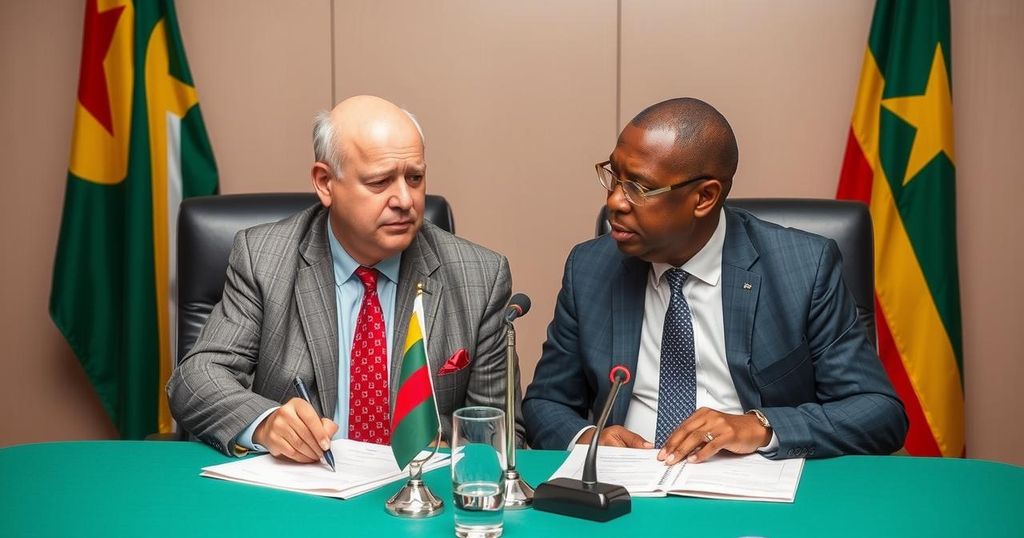Politics
AFRICA, AFRICAN UNION, CORRUPTION, DANIEL CHAPO, DEMOCRACY, FILIPE NYUSI, FRELIMO, JOHANNESBURG, LAMOLA, LEBOMBO, MALELANE, MONDLANE, MOZAMBIQUE, NYUSI, OPTIMIST PARTY FOR THE DEVELOPMENT OF MOZAMBIQUE, PLATAFORMA ELEITORAL DECIDE, REGIONAL COOPERATION, RESSANO GARCIA, SOUTH AFRICA, SOUTHERN AFRICAN DEVELOPMENT COMMUNITY
Fatima Khan
0 Comments
South African and Mozambican Ministers Address Post-Election Crisis
South African and Mozambican ministers convened to address the post-election turmoil in Mozambique, discussing the impact on both economies and the importance of the Constitutional Council’s forthcoming ruling. The meetings aimed to enhance trade security and operational stability at border crossings amidst rising violence linked to disputed election results. The situation remains volatile, with significant protests and casualties recorded since the announcement of the election winner.
On Wednesday, South African ministers engaged in discussions with their Mozambican counterparts regarding the escalating post-election violence in Mozambique, which has significantly affected both nations’ economies. South African Foreign Minister Ronald Lamola emphasized the importance of awaiting the verdict from the Constitutional Council as it pertains to bilateral relations and South Africa’s standing within regional organizations such as the Southern African Development Community (SADC) and the African Union.
Mozambican Interior Minister Pascoal Ronda, who led the delegation, reported that President Filipe Nyusi is actively seeking a resolution to the election dispute, although opposition candidate Venancio Mondlane declined to participate in the dialogue. The ministers reiterated their commitment to enhancing trade security and minimizing disruptions at vital border crossings, specifically the Lebombo and Ressano Garcia points.
The source of the unrest can be traced back to the Electoral Commission’s announcement that Daniel Chapo of the ruling Mozambique Liberation Front (Frelimo) won the Oct. 9 election with 71% of the vote, a result that sparked allegations of vote-rigging from Mondlane and subsequent protests. The Constitutional Council, tasked with addressing the electoral controversy, is expected to deliver its ruling on December 23. Meanwhile, over 110 fatalities have been reported since protests commenced on October 21, as recorded by the election monitoring organization Plataforma Eleitoral Decide.
The article discusses the recent rise in tensions in Mozambique following its October elections, which have led to significant protests and violence. The electoral outcome was contested, with the ruling party’s candidate accused of securing victory through fraudulent means. The situation sparked not only domestic turmoil but has also raised concerns in neighboring South Africa, prompting ministers from both countries to convene and explore collaborative measures to address the instability and its consequences on trade and security between them. The involvement of the Constitutional Council underscores the legal avenues being utilized to resolve electoral disputes in Mozambique, reflecting the judiciary’s role in maintaining democratic integrity. This context is crucial in understanding the regional implications of the situation, especially for cross-border trade and socio-political relations between South Africa and Mozambique.
In summary, the discussions between South African and Mozambican ministers highlight the urgent need to address the political unrest in Mozambique following the disputed elections. The anticipated ruling from the Constitutional Council is vital for resolving the crisis, with significant implications for regional stability and trade. Both governments have recognized the necessity for joint efforts to secure infrastructure and minimize disruptions resulting from the ongoing protests, which have already claimed numerous lives.
Original Source: www.aa.com.tr




Post Comment